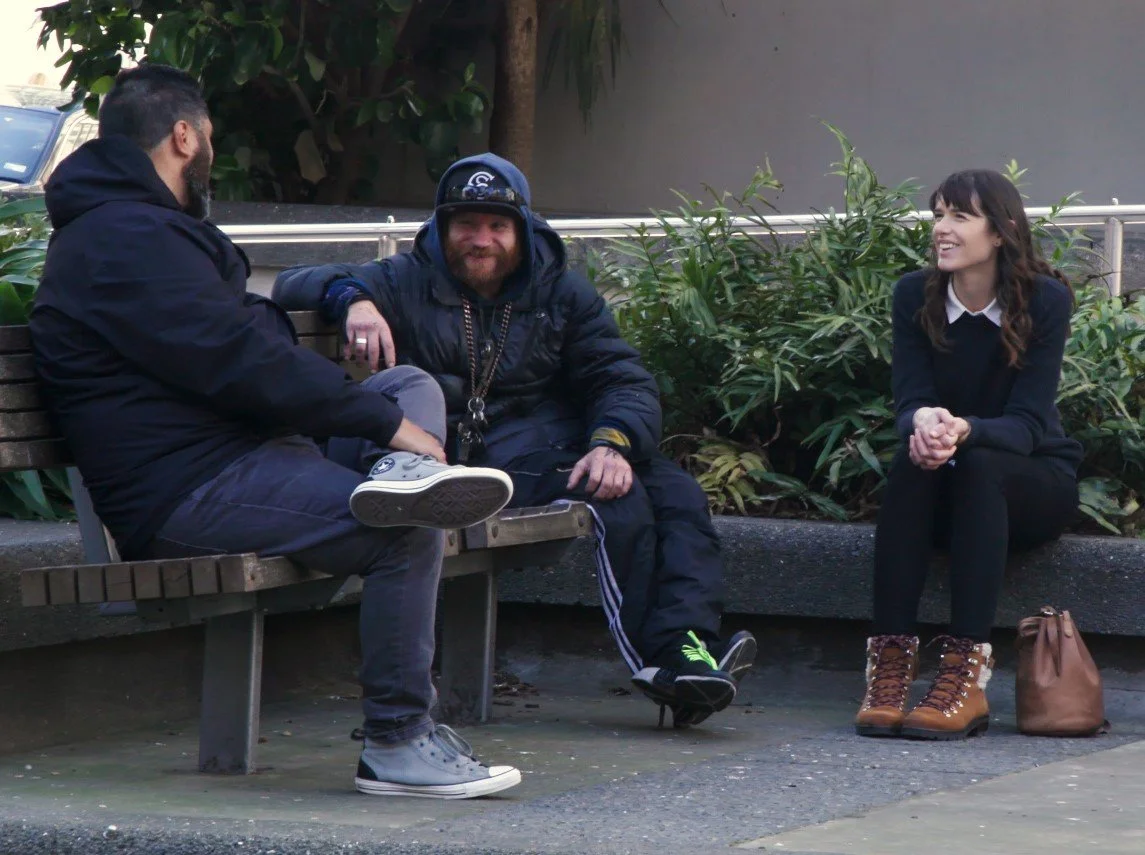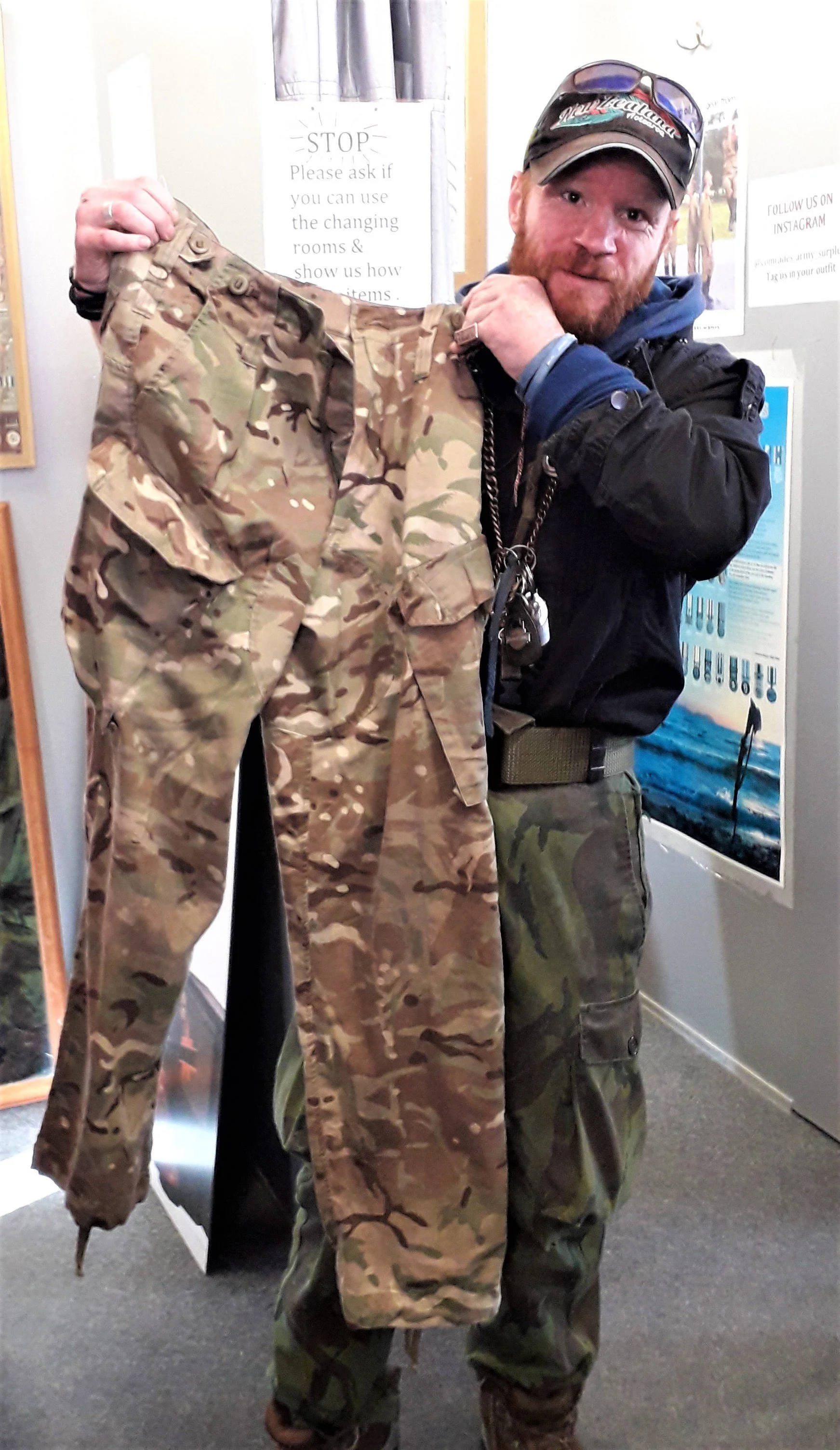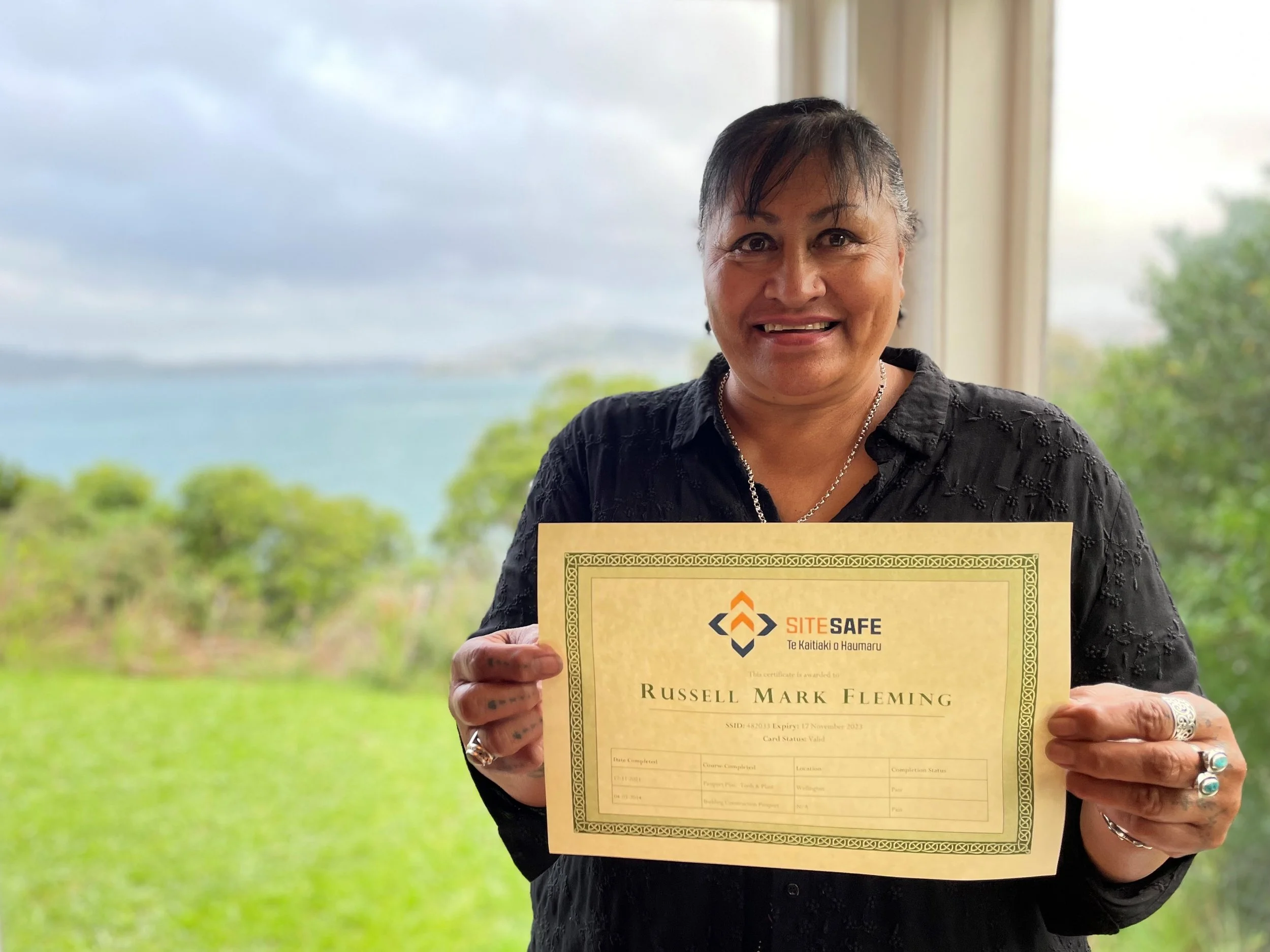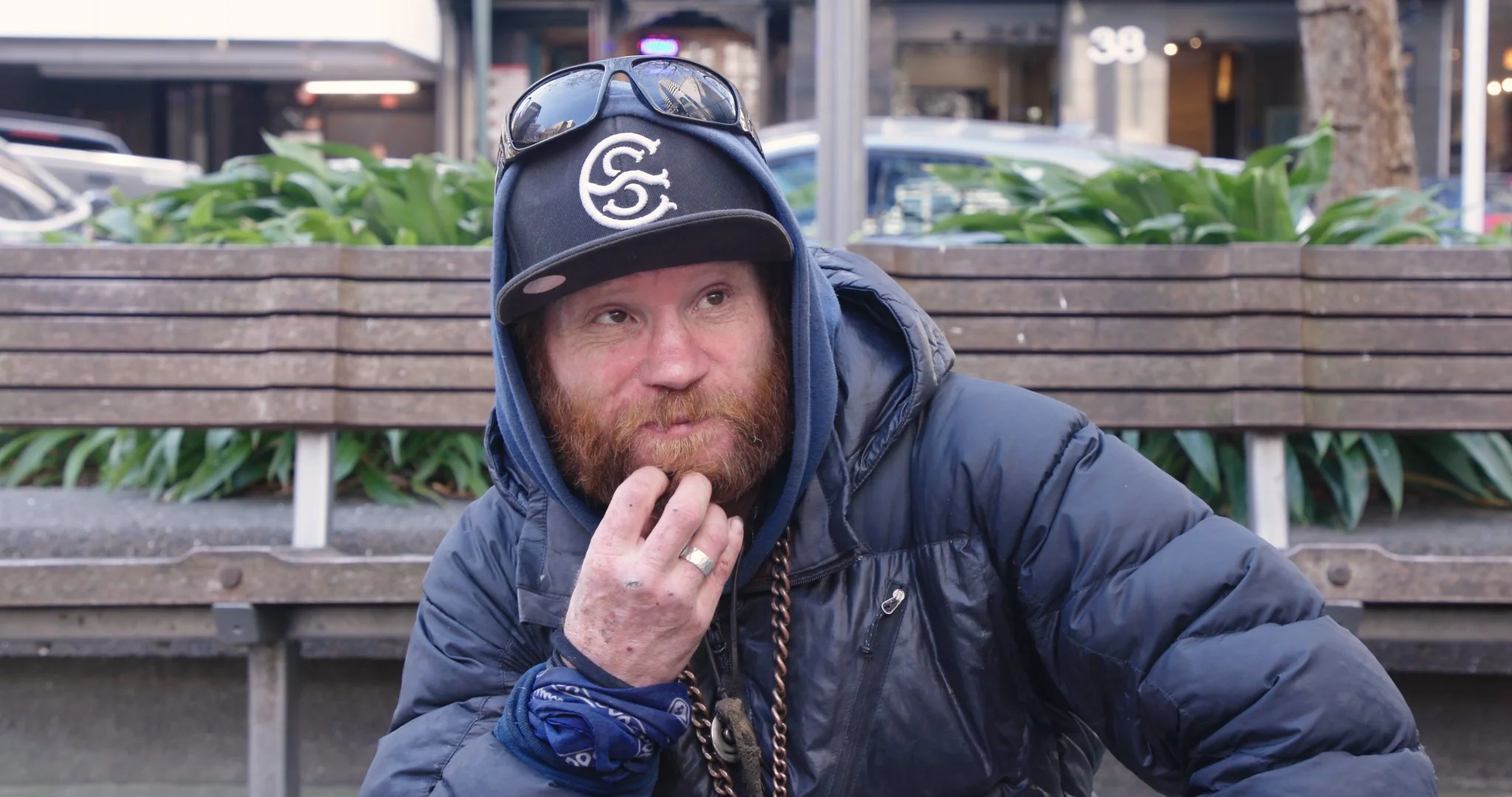Remembering Russell
Two days before Christmas, the team from DCM stood with two police representatives down on the waterfront, at the site where the body of a man they had all supported over the years had been found that morning. After a karakia led by the police iwi liaison kaimahi, the DCM team sang waiata, beginning with “Te Hokinga Mai”...
...TANGI ANA TE NGĀKAU I TE AROHA...
How my heart weeps with sorrowful love...
HEI ORANGA MO TE MŌREHU, TANGI MŌKAI NEI...
The survivor cries out with loneliness...
E RAPU ANA I TE ARA TIKA...
Seeking out the right path...
Russell Fleming was born in Palmerston North and spent his earliest years in Levin. Later the family moved to Lower Hutt. Russell had two older sisters and two older brothers. His mother describes him as her “surprise baby”.
Growing up, Russell learned many skills from his father. He loved tinkering with bikes and as an adult, this continued to be something he enjoyed. On the morning of Russell’s funeral, there was a bike in his flat which he had been working on. He rode bikes; he rode scooters. This was part of who he was. His father Hugh helped him get his heavy truck driver’s license.
Russell always saw himself as a worker. This had been one of his family’s core values. Drunk or sober-ish, he would say to us “I have to get a job!”; “I have to get my truck driver’s license back.” His mother recalls how, when they were together, he would say, “You sit down, Mum. I will make you a cup of tea.” His house was clean. Even on the day of his funeral, there was his washing drying on a clothes horse indoors.
Russell’s undoing was his alcohol addiction. He kind of didn’t have a choice. He faced so many challenges – addictions, mental health, a back injury and a head injury, which he attempted to address through self-medication. Combining his prescription meds with alcohol led to a seizure. Being diagnosed as epileptic meant he lost his truck driver’s license and could not work, something that was so important to him.
As a result of this complexity, Russell could not access or receive the support which he needed, something we often see with the whānau we support at DCM when they experience multiple, complex issues. He did not fit in one category; the fact that he needed support around all three (mental health, addiction, cognitive impairment through head injury) meant he slipped through the cracks of secondary health services.
Russell lived a mobile life, but was always drawn back to Wellington, to this area, to “home”. And so many people in Wellington were connected to him and were part of his story: his friends in the street community, the street cleaners, the Wellington City Council local hosts, his lawyer, all the different tenancy managers, Mōkai Kāinga and the community gardens – even the police were fond of him!
At DCM, Russell connected with and was supported by so many of the team over the years – from the dentists, eye doctor, and Te Aro Health nurses to many DCM kaimahi. Every team at DCM was part of his journey – the Outreach team when he was rough sleeping, the Sustaining Tenancies team when he was struggling to stay in a home, and towards the end of his life, he was housed again through the Aro Mai Housing First collaboration.
Here a few of those he was closest to, share their memories and reflections about Russell.
Russell loved spending time with Natalia and Rob.
Natalia
Natalia Cleland, DCM
I was the first person Russell met when he came back to Wellington in 2018. He had been living at a campsite in Nelson, and he said to me, “I can’t keep living on the street! I need a house!”
He connected with people well, and was able to voice his own aspirations well. I didn’t want to be the one who told him that there was no house for him. I wanted to be in his corner, supporting him. So I put him on the line to the MSD Social Housing team. He howled and screamed down the line – “I need a house! I am going to die out here!” He absolutely demanded a house – and he got one! This is when he got his first tenancy – at Lower Hutt, just around the corner from his parents.
“Yes, the housing stuff; well, it’s stuffed!” – this was probably one of the most incredible things Russell said. He was really smart and could see what was going on in the broken system. Not just looking at his personal situation but seeing that he was caught in a system that was “stuffed”. I was blown away by his insight and how he didn’t complain about his homelessness necessarily but rather he called out the problem for everyone.
He was such a friendly guy, so happy and gregarious. In every photo shown at his funeral, he is smiling, laughing. This was his strength, but also the challenge. He was so connected, he didn’t always know when to step back and give others some space. His personality could be too much for others at times.
Russell was always connected to his family, even in his dis-connection. He always wanted to be re-connected to them all. There was a birthday card from his parents that he kept on his mantelpiece in his final home. When we mentioned this to his mother, she said that it would have been a card from several birthdays ago. He had carried it around with him while he slept on the streets and put it on display when he moved into that final house.
“Yes, the housing stuff; well, it’s stuffed!”
Russell Fleming
Robert
Robert Sarich, DCM
How would I describe Russell? He was ENERGETIC – literally a ball of energy. And he was LOVING. He was also completely and utterly committed to social justice.
I first met Russell on Lambton Quay. I was out on Outreach, walking along the street en route to work early in the morning. I explained where DCM was and left him a card. “Please come down and see us,” was my kōrero. He was open to this, immediately, which was awesome.
When he was housed out at the Hutt, I helped him move in. He was always positive. He was only ever negative when he was drinking.
As I say, Russell was committed to social justice. If things were going wrong for other people, he would often raise it with us. He would tell us about the person, tell us that they needed help, tell us that it wasn’t “fair” how things were for this person. You often had to listen and reflect, wait to see what it was that Russell was getting at, what it was that was going on with the person he was concerned for. But often when you got to the heart of it, Russell was bang on.
Russell was assaulted a few times, when his behaviour was just too big for others to deal with. He would advocate for himself too. I thought it was very brave; he would go to the police, name no names, but he understood he needed to do this – for himself, and for others. “If they could do it to me, they could do it to anyone, Rob!” he would reflect to me.
My feeling is that Russell was a lot more settled in the final months of this life. Russell knew that he was loved, not merely tolerated. Yes, he was a loved ball of energy, dressed in a beautiful korowai.
Hamish
Hamish Knight, Police City Community team, Wellington
I have been in the Police for 14 years, and Russell Fleming is one of those characters like Ben Hana, who you really connect with, who many people know and have connected with. He had that wow factor. He has evolved over time; he has grown and he has changed. And it’s not just that the numbers of bangles up his arm have been added to, the jewellery has changed.
But some things have also stayed the same. Russell has always been pleasant to chat to. Banter. That’s the word. Russell and I enjoyed plenty of banter. He went through his camo stage, with that huge backpack, full of everything! I would pretend that I couldn’t see him in his camo gear. He would be calling out to me, and I would be going: “Who is that talking? I can’t see anyone!”
Yarns – that’s another word. There were some big yarns about his life. I usually had to cut him off or we would be talking on and on and on – forever.
He was talkative, yes, but he was never disrespectful of me, of police, of authority. I didn’t arrest him; there was no offending that I dealt with. I would take the alcohol off him. He would listen to reason. Like when I would explain that he was just being too loud. He knew he needed to tone it down; he just didn’t really know how to go about it. He didn’t go looking for trouble, but it did seem to find him at times.
Russell seemed to be on the fringes. In so many ways. On the fringes of many friendship groups, but never at the heart; never quite experiencing the connections and close friendships he seemed to want. That was a bit sad, watching him try to find a place he belonged.
“I am a homeless person. But I look out for others.”
Russell Fleming
Joe
Pastor Joe Serevi, Salvation Army
I first met Russell at DCM. He was sitting outside, and he wasn’t having a good day. I said to him, “Come on, let’s go for a walk and have a chat.” I took him for a cuppa. Russell just loved to talk, and that’s how I began to connect with him.
Russell was such a character, with his great big backpack, and his military fatigues. He was intelligent, and this shone through whenever you had a kōrero with him, especially when he was sober. He was one of the more challenging people on the streets, and he found it very challenging when he got housed. Those four walls and living alone were difficult for him. Russell was someone who really needed and was always seeking connection with other people.
I was privileged to be one of those people, and to be able to support him in different ways over the years.
Russell
Russell Fleming, in his own words
Many of you have “met” Russell through DCM’s film clip. He was keen to be involved with this – he saw it as a way to lift up DCM and acknowledge the support he, and others, had received from the team. At the time, he was rough sleeping.
In amongst all of the film footage which Ocular shot while making the DCM film clip are conversations which the film crew had with Russell. Producer Steph Miller pulled some of these reflections out for us this month. There is Russell, in his own words, talking about his life and about homelessness.
He speaks about the complexity – of being so used to the street that he often felt more settled there:
“It’s hard. Every time I go in to a house, I am used to being out here.”
“A house. It’s just four walls, you just sit there and do nothing. Whereas out on the street… I guess it’s more of a social thing.”
...while at the same time being totally over it, and wanting to have a safe place to be – ”But then again, you want a house cos you are sick of it.”
He asks the film crew – “If you were homeless...would you be able to go to sleep at night, in the cold, in the wind, in the rain?”
Over and over again, Russell lifts up DCM.
“Natalia is a lovely person; she has put me in to a few houses and stuff”; “Natalia and that; they are cool. DCM are cool fellows!”
At the same time, he draws attention to the key underlying issue – too many people experiencing homelessness and too few houses:
“Natalia and DCM; they are doing a really good job! But they have had to help so many people.”
“DCM have so much on their plate, dealing with so many homeless people!”
“Yes, the housing stuff; well, it’s stuffed!”
And his own kaupapa and commitment to others also comes through, as he shares examples of times when he has been able to help others, especially young people experiencing homelessness and addictions.
“I am a homeless person. But I look out for others”.
Sia
Sia To’omaga, DCM
Russell was little, and loud, and often all over the place with his thoughts, with his kōrero. When he was referred to our team, he had a property in the Hutt, back when DCM’s Sustaining Tenancies team was still covering the Hutt.
When he was living on the streets, he was bullied. I would go out and look for him, go out and find him. He found a safe space for himself, up by parliament. We knew where to find him. At DCM, we have housed him three or four times, and have tried some different options. The challenges were always around his drinking and his behaviour. He could get to a situation where he didn’t feel safe in the whare or living situation we had sorted for him, and then he would return to the street.
One day a few months before his death, he came in to DCM; he was drunk and he was loud. He was calling out to me. “I am going on a course, Sia! Then I can get a job.” He had this card; he was anxious that he might have missed the course, the chance to do this. I was asking him to calm down and to explain what was going on slowly and carefully to me. Here I was trying to call the number on the card – and then a phone call came through! Magic, amazing timing. It wasn’t the same name or number as on the card, but it was a man named Tone, calling to ask DCM about Russell and the course. Tone and I figured out that we knew each other, and we were able to make sure there was a spot on the course reserved for Russell. But it wasn’t going to be easy. When I heard that this training course was going to be at a place at the bottom of Ngauranga Gorge, and that it was going to begin at 7.30am – well, I did not know how Russell was going to get to the right place at the right time. But you know what? He made it! And he completed the course!
The last time I saw Russell, I congratulated him on passing the course. He showed me photos of his house on his phone. I said to him “Wow, Russell! You could eat off the floor. It is so tidy! Well done.” Russell kept a beautiful home.
Many things were going well for Russell in the final months of his life. He was housed – in a home provided by a private landlord. He was more settled and was feeling very hopeful that he would soon be able to work again. After his death, Tone called Sia to ask how he could forward on Russell’s certificate. Sia had to let him know that Russell had passed away, but that the team would love to pick up the certificate. Russell would have been so proud of this achievement, and sharing it with the team at DCM has been another way of acknowledging him, and all that he meant to so many.
Two days before Christmas, the team from DCM stood with two police representatives down on the waterfront, at the spot where Russell’s body had been found that morning. With Rob Sarich on guitar, the team sang waiata, ending with “Ma te kahukura”...
MAU ANA TĀKU AROHA
Cloak yourself with my love
WHAI AKE I NGĀ WHETU
Follow the pathway to the stars
RERE TŌTIKA RERE PAI
Fly straight, fly true
RERE RUNGA RAWA RĀ E
Soar high towards the heavens.
Russell Mark Fleming
31 Mar 1974 – 23 December 2021
“A loved ball of energy”
Words by Michelle Scott.






